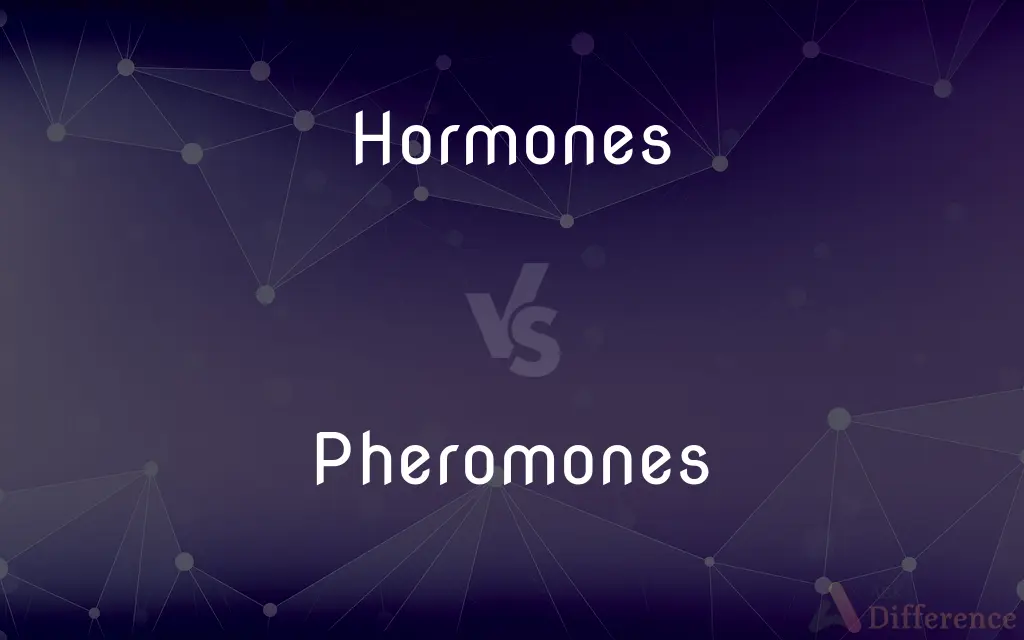Hormones vs. Pheromones — What's the Difference?
By Tayyaba Rehman — Published on November 9, 2023
Hormones are chemical messengers in the body that influence physiological processes; pheromones are chemicals excreted outside the body to affect the behavior of another individual of the same species.

Difference Between Hormones and Pheromones
Table of Contents
ADVERTISEMENT
Key Differences
Hormones are crucial regulatory substances that are produced in the endocrine glands of an organism and circulate in the bloodstream. They play significant roles in controlling various physiological and developmental processes, such as growth, metabolism, and reproduction. On the other hand, pheromones are specialized chemicals that are released into the environment, primarily with the intent of conveying information or provoking specific reactions in members of the same species.
Both hormones and pheromones are quintessential to the way organisms function and communicate, albeit in different realms. While hormones work internally to regulate an organism's bodily functions and maintain its internal environment, pheromones operate externally, facilitating communication between individuals of the same species, often related to mating or danger signals.
Interestingly, the secretion of some hormones can influence the production of pheromones. For instance, certain hormones in animals might trigger the release of mating pheromones, signalling reproductive readiness. Conversely, the detection of certain pheromones can also impact the internal hormonal balance of an organism, eliciting specific physiological responses.
In humans, hormones have well-understood functions – like insulin managing blood sugar levels or estrogen and testosterone regulating sexual development. Pheromones in humans are a topic of ongoing research; while their presence and role aren't as clear-cut as in some other animals, there's evidence suggesting they might play a role in human attraction and communication.
Lastly, while both hormones and pheromones are organic compounds with vital biological functions, their modes of action, target audience, and the purposes they serve set them apart. Hormones are geared towards maintaining homeostasis within an individual's body, while pheromones are about signaling and eliciting specific behaviors in other individuals of the same species.
ADVERTISEMENT
Comparison Chart
Function
Regulate physiological processes internally
Communicate or elicit behaviors externally in same species
Production Site
Endocrine glands
Various glands and tissues, excreted externally
Mode of Action
Act on target cells in the body
Detected by organisms of the same species externally
Examples
Insulin, Estrogen, Testosterone
Sex pheromones, Alarm pheromones
Human Role
Vital for metabolism, growth, reproduction
Possible role in attraction, ongoing research
Compare with Definitions
Hormones
Hormones are endogenous regulatory molecules.
The hormone insulin regulates blood sugar levels.
Pheromones
Pheromones are external chemical signals.
Certain insects release pheromones to attract mates.
Hormones
Hormones are produced in specialized glands.
The thyroid gland produces the hormone thyroxine.
Pheromones
Pheromones facilitate communication among same species.
Ants use pheromones to mark their trails for other ants to follow.
Hormones
Hormones elicit responses in specific target cells.
Testosterone affects muscle development and bone density.
Pheromones
Pheromones elicit specific behaviors in receivers.
Alarm pheromones alert members of the same species to danger.
Hormones
Hormones coordinate various bodily functions.
Growth hormones are essential for the proper development of an organism.
Pheromones
Pheromones are detected through olfaction.
Moths can detect pheromones from potential mates from miles away.
Hormones
Hormones maintain physiological homeostasis.
The hormone cortisol helps manage stress in the body.
Pheromones
Pheromones can influence reproductive behavior.
Female animals may release pheromones indicating their readiness to mate.
Hormones
A substance, usually a peptide or steroid, produced by one tissue and conveyed by the bloodstream to another to effect physiological activity, such as growth or metabolism.
Pheromones
A chemical secreted by an animal, especially an insect, that influences the behavior or physiology of others of the same species, as by attracting members of the opposite sex or marking the route to a food source.
Hormones
A synthetic compound that acts like a hormone in the body.
Pheromones
Plural of pheromone
Hormones
Any of various similar substances found in plants and insects that regulate development.
Hormones
Hormone replacement therapy.
If the doctor gives the OK, I should be able to start hormones by the end of the month.
Hormones
Plural of hormone
Common Curiosities
How do pheromones differ from hormones?
While hormones act within the body to regulate physiological processes, pheromones are released externally to influence behavior in other individuals of the same species.
What are hormones?
Hormones are chemical messengers produced in the endocrine glands that regulate various physiological processes within the body.
Where are hormones produced?
Hormones are produced in the endocrine glands, such as the thyroid, pancreas, and pituitary glands.
Can hormones influence the production of pheromones?
Yes, certain hormones can trigger the release of specific pheromones, particularly in relation to mating signals.
Do all animals produce and respond to pheromones?
Most animals produce and respond to pheromones, though the specifics vary widely across species.
How are hormones transported in the body?
Hormones are typically transported via the bloodstream to their target tissues or organs.
How do pheromones affect behavior in animals?
Pheromones can induce a variety of behaviors, from mating rituals to alerting others to danger.
What roles do hormones play in the human body?
Hormones regulate a multitude of processes, including metabolism, growth, mood, and reproduction.
Can pheromones be used in pest control?
Yes, pheromones are often utilized in pest control to either attract or repel pests.
Do humans produce pheromones?
Humans are believed to produce pheromones, but their exact role and impact are subjects of ongoing research.
How do organisms detect pheromones?
Organisms detect pheromones primarily through olfactory systems.
Are pheromones species-specific?
Yes, pheromones are typically species-specific, meaning they primarily affect members of the same species that produced them.
Can an imbalance in hormones affect health?
Absolutely, hormonal imbalances can lead to various health conditions, from diabetes to thyroid disorders.
Are there synthetic versions of hormones and pheromones?
Yes, there are synthetic versions of both, commonly used in medical treatments and research respectively.
Do hormones only affect physical processes?
No, hormones can influence both physical and emotional processes, such as mood and stress response.
Share Your Discovery

Previous Comparison
Louis Vuitton vs. Louboutin
Next Comparison
Discrimination vs. OppressionAuthor Spotlight
Written by
Tayyaba RehmanTayyaba Rehman is a distinguished writer, currently serving as a primary contributor to askdifference.com. As a researcher in semantics and etymology, Tayyaba's passion for the complexity of languages and their distinctions has found a perfect home on the platform. Tayyaba delves into the intricacies of language, distinguishing between commonly confused words and phrases, thereby providing clarity for readers worldwide.













































